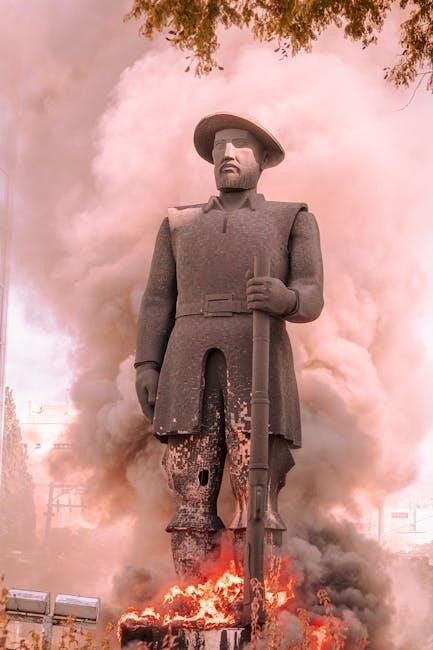World history explores the development of human societies, emphasizing connections and exchanges across regions. It offers insights into global challenges, fostering a deeper understanding of our shared past.
Overview of World History
World history encompasses the study of major global events, cultural exchanges, and societal transformations from ancient times to the present. It highlights the interconnectedness of civilizations, showcasing how different regions have influenced one another. Early societies emerged along rivers, leading to advancements in agriculture, governance, and technology. The rise and fall of empires, such as those in Mesopotamia, Egypt, China, and Rome, laid the groundwork for modern political and social systems. The Middle Ages saw the spread of religions like Christianity, Islam, and Buddhism, shaping cultural and ethical frameworks. The Age of Exploration and Industrial Revolution introduced global trade networks and technological innovations, reshaping economies and societies. Contemporary history addresses 20th- and 21st-century challenges, including global conflicts, decolonization, and technological advancements. Understanding this broad narrative provides insights into humanity’s shared experiences and ongoing development.
Importance of Studying World History
Studying world history is essential for understanding the complexities of global challenges and cultural diversity. It fosters empathy by revealing how different societies have interacted, cooperated, and conflicted over time. By examining historical events, individuals gain insights into the roots of contemporary issues, such as political tensions, economic inequalities, and social injustices. World history also cultivates critical thinking skills, as it requires analyzing patterns, causes, and effects across vast timeframes and regions. This discipline encourages a broader perspective, helping individuals appreciate the interconnectedness of the world. Moreover, it equips learners with the ability to draw lessons from the past, enabling them to make informed decisions about the future. Ultimately, studying world history promotes a deeper understanding of shared human experiences and the dynamics that have shaped our global community.
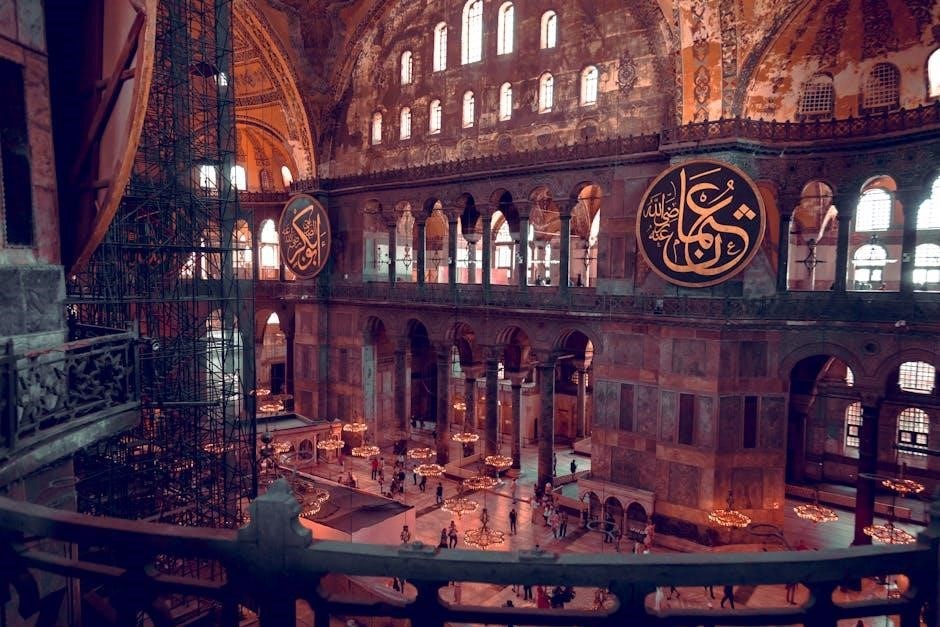
Ancient Civilizations
Ancient civilizations laid the foundation of human society, transitioning from nomadic life to settled communities, fostering agriculture, governance, and culture, shaping the course of global development.
The Emergence of Early Societies
The emergence of early societies marked a significant shift from nomadic, hunter-gatherer lifestyles to settled agricultural communities. This transition, often associated with the Neolithic Revolution, enabled the domestication of plants and animals, leading to food surpluses and population growth. Early societies developed social hierarchies, specialized labor, and complex governance systems, laying the groundwork for civilizations. The rise of cities, such as those in Mesopotamia, Egypt, and the Indus Valley, further accelerated cultural, technological, and political advancements. These societies also saw the development of writing, art, and religion, which became central to their identities. Understanding this period is crucial for grasping how early humans adapted to their environments and created the foundations of modern society.
Key Contributions of Ancient Civilizations
Ancient civilizations made profound contributions to human progress, shaping the foundation of modern society. Mesopotamia pioneered writing with cuneiform, while Egypt developed monumental architecture and advanced medical practices. The Indus Valley Civilization excelled in urban planning and water management. Ancient China introduced the compass, gunpowder, and the printing press, revolutionizing navigation, warfare, and knowledge dissemination. In Mesoamerica, the Maya and Aztecs advanced astronomy and mathematics. These civilizations also laid the groundwork for governance, with systems like democracy in ancient Greece and legal codes such as Hammurabi’s. Their cultural achievements, including art, literature, and philosophy, continue to inspire and influence contemporary societies. The legacy of these contributions underscores the enduring impact of ancient civilizations on global development.
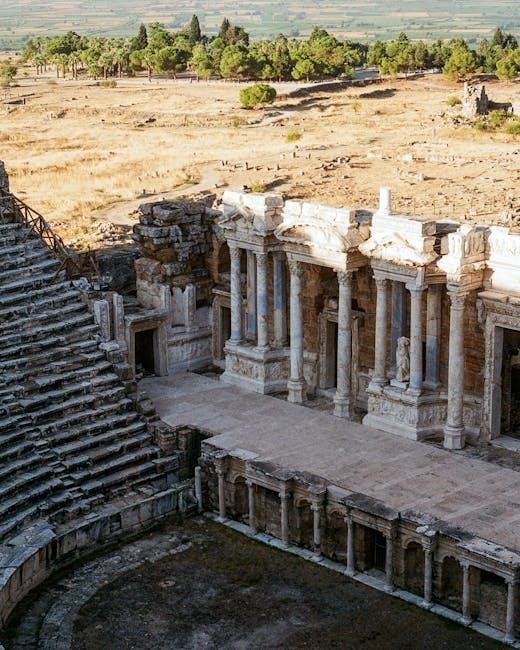
The Middle Ages
The Middle Ages, spanning the 5th to 15th centuries, saw the rise of feudalism, Christianity, and cultural transformations amidst events like the Crusades and the Black Death.
Medieval Period Overview
The medieval period, spanning approximately from the 5th to the 15th century, was marked by significant social, political, and cultural developments. It witnessed the rise of feudalism, a system where lords owned land and peasants worked it in exchange for protection. The Catholic Church played a central role, influencing art, education, and law. This era also saw the construction of grand cathedrals, the emergence of knights, and the formation of guilds that shaped trade and commerce. The Crusades, a series of religious wars, highlighted conflicts between Christian and Muslim worlds. Despite its challenges, including the devastating Black Death, the medieval period laid the groundwork for the cultural and intellectual advancements of the Renaissance.
Significant Events and Their Impact
The medieval period was marked by pivotal events that shaped global dynamics. The Crusades, a series of religious conflicts, altered relations between Christianity and Islam, fostering both hostility and cultural exchange. The Black Death, a pandemic that devastated Europe, led to significant social and economic changes, including the decline of feudalism and a shift in labor dynamics. These events underscored the interconnectedness of societies and their vulnerability to widespread crises. Understanding these moments provides insight into how historical challenges have influenced modern societal structures and global interactions.
The Early Modern Period
This era witnessed transformative changes, including the Age of Exploration, the rise of nation-states, and the expansion of global trade networks. Explorers like Columbus and Vasco da Gama established new routes, fostering cultural and economic exchanges between distant regions. The emergence of powerful nation-states in Europe, such as Spain, France, and England, reshaped political landscapes. Additionally, the Renaissance sparked intellectual and artistic advancements, while the Protestant Reformation challenged religious authority. These developments laid the groundwork for modern globalization and the interconnectedness of the world, influencing social, economic, and cultural systems that persist today. The Early Modern Period was a time of profound upheaval and innovation, setting the stage for the complexities of the contemporary world.
Age of Exploration and Colonization
The Age of Exploration, spanning the 15th to 17th centuries, was a period of unprecedented global discovery. European powers, such as Portugal and Spain, led the way, driven by the quest for new trade routes, resources, and territories. Explorers like Christopher Columbus and Vasco da Gama pioneered maritime routes, connecting Europe to the Americas, Africa, and Asia. This era saw the establishment of colonies, reshaping the political and cultural landscapes of the Americas, Africa, and parts of Asia. The Columbian Exchange introduced new crops, diseases, and ideas across continents, profoundly impacting societies. Meanwhile, the rise of joint-stock companies and mercantile capitalism fueled economic expansion. However, colonization also brought exploitation, violence, and displacement of indigenous populations, leaving a complex legacy that continues to influence modern global dynamics and cultural identities. This period laid the foundation for European dominance and the interconnectedness of the modern world.
The Rise of Nation-States
The rise of nation-states emerged in Europe during the early modern period, following the decline of feudalism and the fragmentation of empire-based systems. The Peace of Westphalia (1648) marked a turning point, establishing the concept of sovereign states with defined territorial boundaries. Nation-states were characterized by centralized governance, national identity, and the consolidation of power under monarchies or republics. This period saw the transition from decentralized medieval structures to more unified political entities. The rise of nationalism further solidified these states, as people began to identify with shared cultural, linguistic, and historical ties. Key factors included military advancements, economic centralization, and the development of administrative systems. The nation-state model eventually spread globally, shaping modern political structures and influencing global relations, often at the expense of indigenous and non-European societies. This transformation laid the groundwork for the modern international system, emphasizing sovereignty and territorial integrity.
The Industrial Revolution
The Industrial Revolution transformed societies through technological innovations, shifting economies from agrarian to industrialized systems. It introduced mechanized production, steam power, and mass manufacturing, reshaping global labor and trade patterns.
Technological and Social Transformations
The Industrial Revolution brought profound technological and social changes. Innovations like the steam engine, power looms, and factories revolutionized production, enabling mass manufacturing. Urbanization accelerated as people moved to cities for work, creating new social classes. The rise of industrial capitalism reshaped economies, while labor movements emerged to address worker exploitation. Societies adapted to these shifts, leading to reforms in labor laws and education. The period also saw the expansion of global trade networks, connecting regions more tightly than ever before. These transformations laid the foundation for modern industrialized societies, highlighting the interplay between technology, economy, and culture in shaping human history.
Global Economic Shifts
The Industrial Revolution sparked significant global economic shifts, reshaping trade, production, and wealth distribution. Industrialized nations expanded their influence through colonization, extracting resources and establishing new markets. This period saw the rise of capitalism, with factories and machinery driving economic growth. However, it also led to stark inequalities, as wealth concentrated among industrial elites while workers faced exploitation. Global trade networks expanded, connecting distant regions and fostering economic interdependence. The emergence of new industries and technologies further accelerated these changes, creating a more interconnected world economy. These shifts laid the foundation for modern economic systems, emphasizing industrialization, globalization, and the complexities of wealth distribution that persist today.
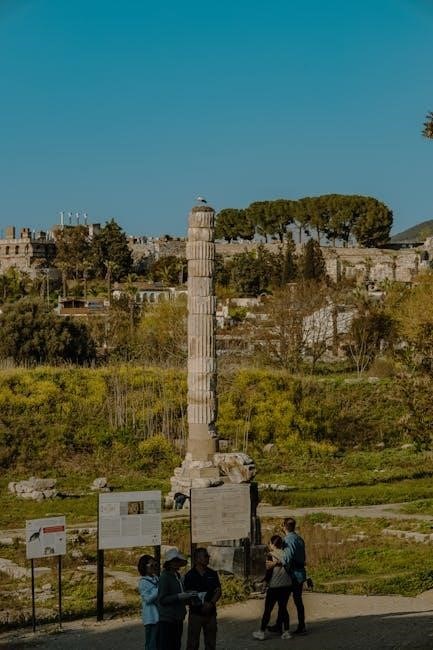
Contemporary History
Contemporary history covers global developments from the 20th century onward, focusing on globalization, technological advancements, political shifts, and cultural transformations that shape the modern world.
20th and 21st Century Developments
The 20th and 21st centuries witnessed unprecedented global transformations. The 20th century was marked by two devastating World Wars, the Cold War, and decolonization, reshaping political landscapes. Technological advancements, such as the internet and space exploration, revolutionized daily life. The 21st century saw the rise of globalization, economic interdependence, and digital technologies. Challenges like climate change, pandemics, and political polarization emerged, impacting societies worldwide. These centuries highlight humanity’s capacity for innovation and its struggle with complex global issues, defining the modern era’s progress and challenges. Understanding these developments is crucial for grasping the interconnected nature of contemporary history and its relevance to current global dynamics.
Key Themes in Modern History
Modern history is characterized by several overarching themes that have shaped global development. Globalization has interconnected economies, cultures, and societies, fostering both collaboration and competition. Technological advancements, particularly in digital and communication technologies, have revolutionized daily life and work. Political shifts, such as the rise of democracy and the decline of authoritarian regimes, have redefined governance. Social movements, including feminism, civil rights, and environmental activism, have pushed for equality and sustainability. Economic transformations, such as the rise of capitalism and the digital economy, have reshaped wealth distribution and labor systems. These themes highlight the complexity and interconnectedness of modern societies, illustrating how historical developments continue to influence contemporary challenges and opportunities. Understanding these themes is essential for grasping the dynamics of the modern world and its ongoing evolution.
World history reveals humanity’s shared experiences, highlighting global interconnectedness and the lessons of the past. Understanding this journey fosters empathy, wisdom, and a deeper appreciation for our collective future.
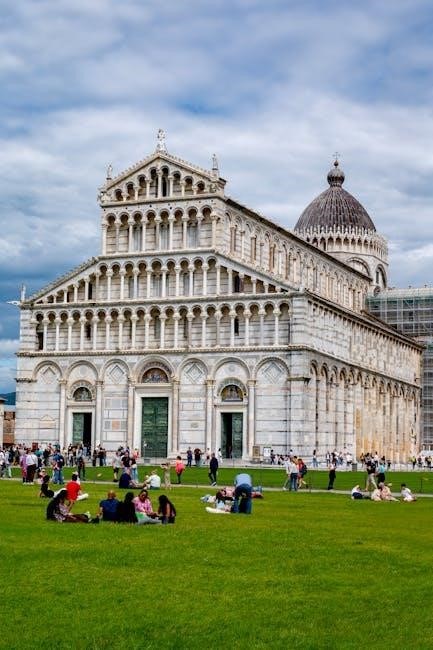
Reflections on the History of the World
Reflecting on world history reveals a complex tapestry of human experiences, marked by both cooperation and conflict. The interconnectedness of civilizations, from ancient trade routes to modern globalization, underscores the shared human journey. Understanding historical patterns, such as the rise and fall of empires or the evolution of ideas, provides insights into contemporary challenges. The study of history fosters empathy and critical thinking, enabling us to learn from past achievements and mistakes. By examining diverse cultures and events, we gain a deeper appreciation for the resilience and creativity of humanity. Ultimately, reflecting on world history encourages us to consider how our actions today might shape the future for generations to come.
The Relevance of Historical Study Today
Studying history remains vital in understanding contemporary issues and navigating the complexities of the modern world. By analyzing past events, societies, and cultures, we gain insights into the roots of current challenges, such as political conflicts, economic inequalities, and social injustices. History equips us with critical thinking skills, enabling us to evaluate evidence, challenge assumptions, and make informed decisions. It also fosters empathy by exposing us to diverse perspectives and experiences, helping us appreciate the interconnectedness of humanity. Moreover, historical knowledge provides a foundation for addressing global problems, such as climate change and technological advancements, by drawing on past successes and failures. In essence, history is not just about the past; it is a tool for shaping a more informed and equitable future.

